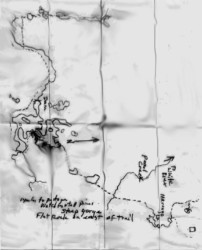The Treasure of Namakagon - Ships Free! |
|
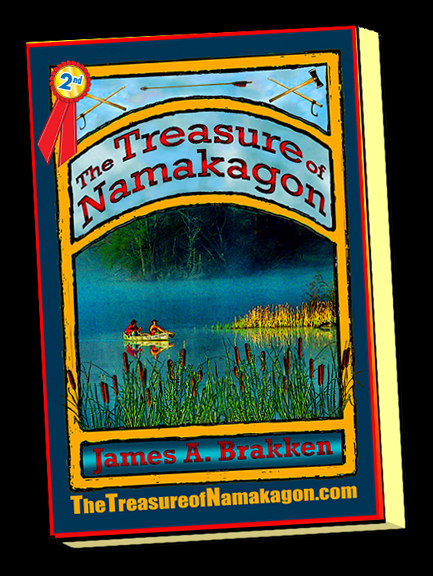
$ 17.99 USD |
|
|
THE TREASURE OF NAMAKAGON
2nd PLACE WINNER in Amazon’s 2013 BREAKTHROUGH NOVEL AWARDS (ABNA) out of 10,000 novels entered worldwide! |
|
You're sure to enjoy this fast-paced, fact-based award-winning novel---historical fiction at its best. Illustrated. Signed and inspected by the author, James Brakken.
THE TREASURE OF NAMAKAGON:
An 1883 lost treasure and lumberjack adventure. 26 stories woven into a great lumberjack tale. Set in Bayfield and Sawyer Counties in northern Wisconsin and in Chicago. Fiction based on fact. Text and 63 illustrations by James A. Brakken.
BREAKING NEWS: Book 1, The Treasure of Namakagon, is now $1.49 for Kindle, Sony, and other readers. Tell your facebook friends. Find it at
https://www.smashwords.com/books/search?query=The+Treasure+of+Namakagon
All books from this site are top quality, inspected softcovers, signed by the author.
More at Online Store page.
3 REASONS TO PURCHASE HERE & NOT AT AMAZON: 1, BVP ships free to entire US and pays all sales tax. 2, Every book is inspected and signed by the author. 3, Amazon has undercut America's small, Indy bookstores to the point where many have closed. We need our Indy bookstores. Please help. 4, Amazon takes a big percentage of sales. Although you might save a dollar, you will also be denying the author about five.
Independent authors depend on internet sales. Thanks for supporting Indy authors by ordering from our websites. JB
All BVP books are made in USA and make great gifts!
The Chief Namakagon Trilogy (Ships Free) |
|
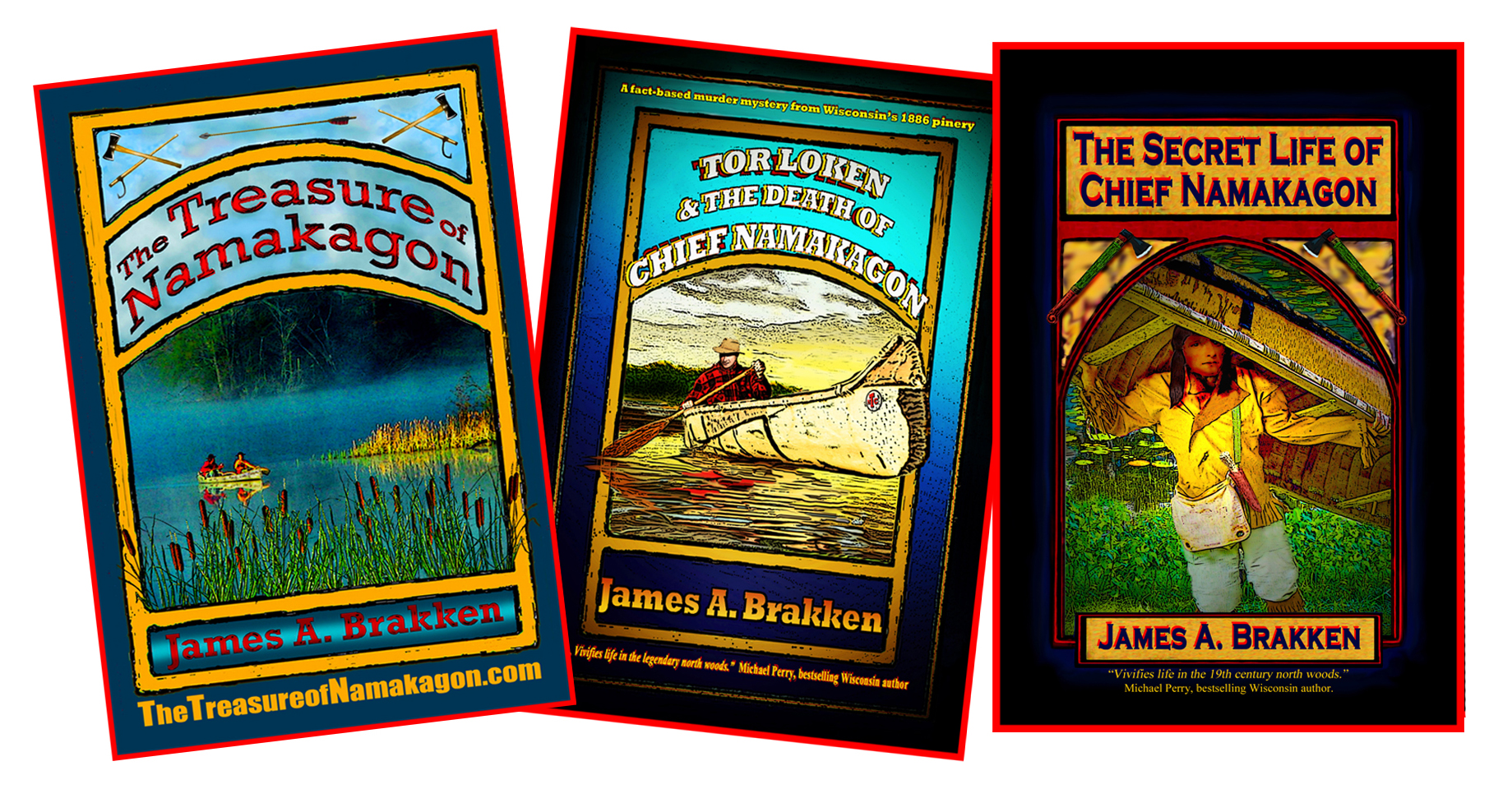
$ 49.99 USD |
|
|
Save $13, (that's $6 off the reg book price, $3 sales tax, and $4 shipping cost) when you order the complet set! All 3 Chief Namakagon books, signed and shipped free anywhere in the lower 48 states. (Email us for other destinations.) We pay the sales tax, too. |
|

|
PRINTABLE ORDER FORM for ALL BOOKS.pdf Size : 242.503 Kb Type : pdf |
What readers say about James Brakken’s writing:
Publisher’s Weekly Magazine review:
“… a fascinating tale … Namakagon, an Obijwa chief, is the heart of this story of the land ... There is a strong sense in this book of oneness with nature.” “There’s rip-roaring action …” “The book is so well-written.” “Difficult to put down; a great read.”
Amazon Books review:
“The writing style of this piece is its greatest strength.” “The flow of the words is like an old fashioned song.”
Writer’s Digest review:
“It’s the dialog and characters that drive The Treasure of Namakagon, a book that, if the audience for (adventure novels) was more like it was in the 1950s, would likely be sitting at or near the top of the best seller’s lists. It appears as if author James A. Brakken is determined to make a go of this series, and … he’s made at least one fan of this reader.” Judge, 22nd Writer’s Digest Annual Self-published Book Awards
FOR ALL BVP BOOKS, DISCOUNTS, MORE, see the "ONLINE STORE" page.
Click on the images to see the DARK or the BVP pages
What readers say about James Brakken’s writing:
“Wonderfully written …. Compelling …. Captures the reader’s attention and keeps us reading.” A good piece of writing with suspense and action …”Jerry Apps, award winning Wisconsin author.
"Weaving mystery into history, James Brakken’s writing vivifies the tumultuous nature of 19th-century life in the legendary north woods."
Michael Perry, NYT bestselling Wisconsin author
"Open with caution. You won't want to put this one down."
LaMoine MacLaughlin, President, Wisconsin Writers Association
"A twisting, thrilling mix of mystery, adventure and legendary treasure. Wisconsin history buffs will find this book a treasure in itself. An exciting adventure for all ages.”
Waldo Asp, AARP Chairman
“Brakken takes his readers down Northern Wisconsin’s untamed Namakagon River, back when giant virgin forests lured heroic lumberjacks to seek their fortune. In scene after scene, the reader is surrounded by the beauty of pristine woods and lakes, rooting for the good guys to beat out the greedy.”
A. Y. Stratton, author of Buried Heart
“Brakken animates the long history of conflicts over Wisconsin’s water and mineral resources. Interplay between citizens, corporations and government will be familiar to people following today’s debates over mining and groundwater protection in Wisconsin, or energy development in other regions.”
Eric Olson, UWEX-Lakes Director
“I liked it!” Larry Meiller, Wisconsin Public Radio host.
The Treasure of Namakagon FACTORY BLEM |
|
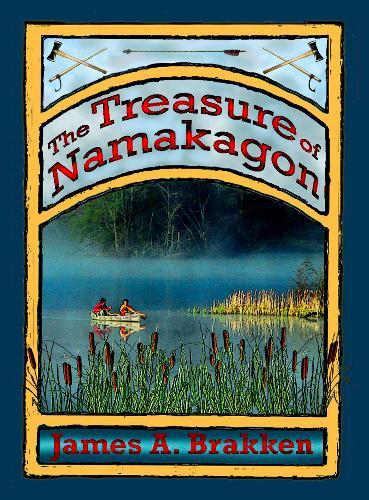
$ 14.99 USD |
|
|
SAVE $3 OVER REGULAR ONLINE PRICE WHILE SUPPLIES LAST! Tax included. Ships Free. A twisting, turning adventure, 43 chapters, 63 illustrations and glossary. AUTOGRAPHED Factory blem. Has very slight problem with images. Otherwise identical to regular softcover. Some of these may have slight cover damage such as slight scuffing or a crease on the cover. If you are not pleasd with your copy, We will exchange for another, though you'll have to pay shipping. BVP has sold many of our blems without a single complaint. Books we feel are too damaged to reflect well on BVP are never sold. Signed and shipped free anywhere in the US. (Email us for other destinations.) We pay the sales tax, too.
|
|
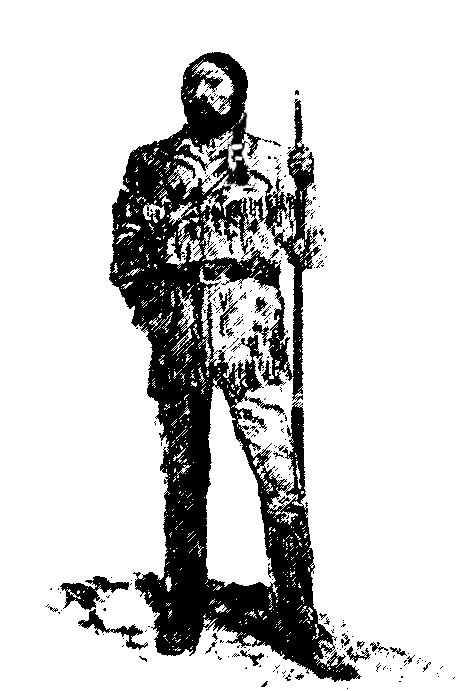
Namakagon stood to meet them. He was broad-shouldered and a half-foot taller than anyone in the room. He had black hair and a full beard. His buckskin clothes were clean and neat. A diamond-shaped silver medallion was neatly stitched onto his shirt. A dark belt around his waist supported a sheathed knife and two buckskin pouches.
Free Sample: DISCUSSION AND STUDY GUIDE AND MAPS. See Index
I want to see a FREE SAMPLE of this ebook on: (Click one)
My Kindle / My Nook reader / My IPad/ My Desktop PC / My Laptop PC / My Notebook PC / My Cell Phone / My I-Pad / My Blackberry / / Kindle for PC / Kindle for Mac / Adobe Digital Reader / .PDF / Barnes & Noble / HTML / Amazon Reader / Sony LRF / Palm / .RTF / EPUB / .TXT / JavaScript / Other
Or . . . READ SAMPLES FREE RIGHT NOW ON THIS WEBSITE. JUST CLICK ON "clips from the book", ABOVE.
BEST DEAL: ORDER IT NOW AT SMASHWORDS.COM for $.99 for the entire book, all illustrations, maps, and all future additions are automatically yours free. The SmashWords price is a steal! LIMITED TIME OFFER.
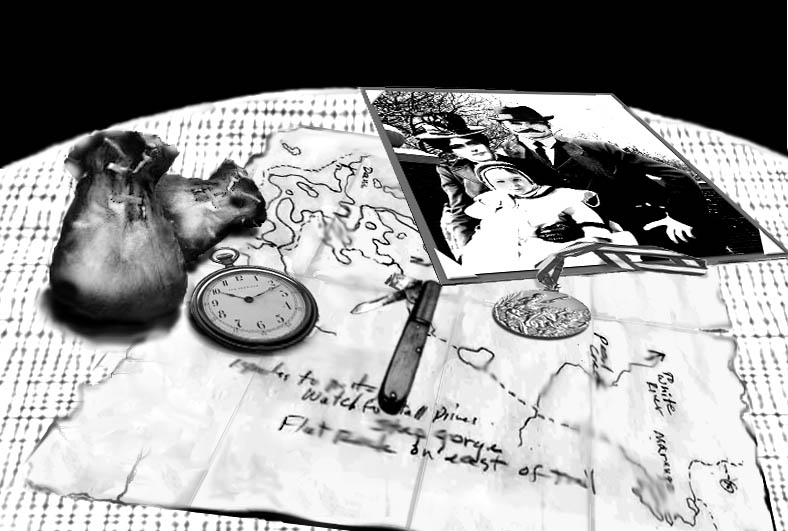
Above: "One pouch held tobacco. In the other was a map and an old pocketknife with one broken blade,
a battered silver pocket watch, an old gold medal, and a very old tintype photograph. Scratched into the back of the photo was ‘1868'."
Below: Charlie Martin on a star load of twenty-footers.
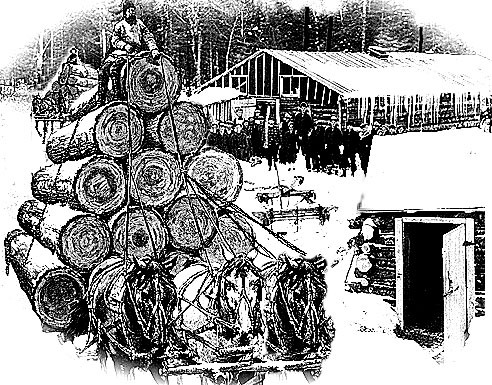
This is a thrilling north woods
adventure, based very closely on historical facts from the 1880s logging days near Cable and Hayward, Wisconsin.
Join with 16 year-old Tor Loken as he and his mentor, Chief Namakagon, work to outwit the big timber tycoons and protect the secret of the silver mine. (This mine truly existed and has not been found since the chief's death in 1886.)
Entire book available NOW for Kindle and all other readers! See the first 10% free before deciding to purchase. [Purchase price is just $.99 for a limited time]
Click on this link:
https://www.smashwords.com/books/view/51102
Chapters available here & now. (Go to 'CLIPS' page at top.)
Kindle software for your PC is FREE!
Kindle for personal computers is free at
http://www.amazon.com/gp/feature.html/ref=kcp_pc_mkt_lnd?docId=1000426311
From THE TREASURE OF NAMAKAGON, here's part of Chapter 26:
In this excerpt, 16-year-old Tor Loken, is learning the ropes from seasoned lumberjacks.
Chapter 26
Goin’ to Town
Tor was back in the woods with Mike Fremont and his men the next morning. Charlie Martin, a sawyer for the crew and a seasoned lumberjack, gave Tor a few tips on how to use a two-man crosscut saw.
“Now, Tor,” said Charlie, “usin’ a two-man crosscut is like waltzin’ with a pretty gal. Only difference is that you gotta look at Leroy Phipps on the other end of the saw, and, Tor, ol’ Leroy ain’t all that pretty a sight.”
“You best mind your clever tongue, Charlie Martin,” groused Leroy with a wink.
“Tor, you right handed?”
“Yessir. I am.”
“Good. Leroy’s a southpaw. That works out best. He will keep his left hand to the outside and his right hand near the steel. You will do just the opposite. After you and him set the cut you just follow Leroy’s lead. First, I will whittle out the notch.”
His double-bit ax in hand, Charlie Martin stepped closer to the near-perfect white pine. Almost four feet in diameter, it stood over ninety feet tall and would easily scale more than three thousand board feet. At the mill it would bring about twenty dollars—nearly three week’s pay for a pinery lumberjack.
“Five trees like this could build you a comfortable house in Chippeway Falls with enough left over to build a two-story privy out back,” said Leroy. “Yesiree, it will fetch a good dollar at the mill.”
“They call these pines green gold,” added Charlie, “and there’s so much of it in the pinery, they say it will take a thousand years to cut it all. Think of it, Tor—a thousand years.”
“Yep, green gold,” Leroy repeated. “More money out here than in half a dozen California gold mines and you ain’t gotta be no gol dang woodchuck to get your share of it.”
“All right,” Charlie began. “First, make sure there ain’t no brush or nothin’ in your way.” Looking up, he walked around the tree again. “If your pine’s got a lean to it, then that is the way you wanna send her. Don’t never go agin’ the law of gravity. Next thing you look for is a widowmaker—that’s any dead limb what can come back to swat you when she falls. Tor, I seen good men sent home by widowmakers. Some a them went in coffins, boy. You watch yourself.
“Now, you see that dead limb up there? Looks pretty small from here, but, when it strikes you down, you will find out it’s a good eight, maybe ten inches thick and near to a hundred pounds.” He studied the tree again.
“All right, fellas. The notch goes here, on the same side where you want it to drop. If you notch your tree in the right spot and then make your saw cut opposite the notch, well, you can drop a tree just about anywhere you want. I’ll show you.”
Charlie snatched Tor’s hat, walked about thirty paces, and laid the hat on top of the snow. Coming back to the big white pine, he laid his ax in the snow, handle pointing toward the hat. The woodsman bent down low, sighting down the ax handle. He looked back at the tree, picked up his ax, kicked some snow out of the way, and looked up again, then down. Charlie Martin established his stance by digging in with his boots. “Here goes, boys. We’ll send her over there by Tor’s hat.”
His ax angled slightly upward, Charlie took five swings. He then took six more bites a bit higher and with a downward pitch. Large wood chips sailed through the air, landing in the fresh snow. The veteran woodsman then shifted his position, stepping to the other side of the notch. Ten more swings of his ax and the notch was cut.
Two blue jays flew into a nearby birch, scolding the loggers with their screechy calls.
“Tor,” Charlie said, “there is something else you need to do ’fore you start your saw cut. Figure out just where you are gonna run when she comes down. You make dang sure there ain’t nothin’ in your way. You do not wanna be anywhere close when she falls, just in case she bucks back toward you. All right, boys, time to take your turn.”
Tor followed Leroy to the base of the tree. Leroy swung one end of the long, limber saw to his partner. They placed the teeth chest-high against the bark, opposite Charlie’s notch. Leroy pulled the saw toward him. Tor pulled back, starting the cut.
The tall, stately tree hardly noticed these small men at its base. Had they stopped now, it would have sent its pungent sap into the wound and lived another hundred years. But the lumberjacks didn’t stop. Leroy stepped up the pace. Tor followed.
“Tor,” said Charlie, “yer usin’ your arms too much. Keep yer knees locked and bend at your waist more. Just let the saw flow back and forth, Son.”
The sharp crosscut saw sang out as it sliced through the pine. Sawdust, ripped from the cut, soon covered the deep snow around them, sending the fragrance of white pine into the icy air. Tor began to sweat.
“Too much steam, Tor,” shouted Leroy. “Ease up. Just let the saw do the work.” Tor relaxed, following the rhythm of the saw.
Charlie Martin looked on as the saw swept back and forth, back and forth, back and forth. “There you go, Tor, now yer goin’ to town.”
As though the giant white pine was defending itself from this attack on its clear heartwood, the tree pressed its enormous weight down, closing the saw cut just slightly, and stopping the blade. But it was not enough.
Leroy jammed his sharp, steel wedge into the kerf. He gave it a smack with the side of the hammer that hung from his belt. This opened the cut just enough to allow the saw to move freely again. Back and forth, back and forth again went the saw in rhythm. Suddenly, from deep within the tree, came a loud, solid crack. The white pine was losing to this assault on its life. And the men kept sawing. Back and forth. Back and forth. Back and forth.
“Watch her now, fellas.”
Tor noticed the kerf was getting wider. The tree now leaned away from the cut slightly. Leroy’s steel wedge, no longer pinched in place, fell to the snow below. Back and forth, back and forth, back and forth, and another solid ca—rack came from deep within. Leroy stopped, pulling the saw free from the kerf and from Tor’s hands. He carried it away from the tree. Tor, seeing his partner move back, did the same. They watched in silence for a moment.
Leroy cupped his hands around his mouth, crying out, “Tim—berrrrrrrrr.”
Tor looked up. The tree didn’t seem to move. Leroy and Charlie quickly stepped farther back. Tor followed, still looking up.
“Keep yer eye on the kerf, Tor,” said Charlie.
Tor watched as the saw-cut widened ever so slowly. Another loud crack came from deep inside the stump, then crack————crack——ca-rack—crack, crack, crack and the tree was on its way down.
The top moved slowly at first, then gathered speed, soon plummeting earthward, faster and faster, snapping limbs off nearby trees. Snow fell from the upper branches, creating a cloud of white above the men. The huge tree plunged down and down and then smashed to the ground with a thunderous crash. Snow and pine needles billowed high into the air. Twigs and small branches flew in every direction before raining down around the men.
Recoiling from its impact with the frozen ground, the great white pine gave a final shudder and then lay silent, motionless, dead. Never again would it sway in the wind.
The blue jays that had been scolding the lumberjacks took to the sky, piercing the cold morning air with high-pitched screams. They disappeared into what remained of the pine forest as the sound of the fall echoed off the nearby hills. Then—all was silent.
The stately, three-hundred year old pine now lay before the lumberjacks. Its seed had sprouted before the pilgrims gathered for their first Thanksgiving. Full grown when the American colonies declared independence from English rule, it withstood many fierce summer windstorms and winter blizzards. It survived forest fires, droughts, attacks by insects. But, like all the others, this grand white pine was no match for the sharp crosscut saws of these modern day lumberjacks. No longer a tree, it was now just more timber bound for the mill.
The forest was still until Charlie Martin broke the silence with a belly laugh, saying. “Too bad ‘bout yer hat, Tor.”
In
part 2 of this chapter, the lumberjacks go to town for a Saturday night
of fun, each with a $5 bill from the boss. (A week's pay, by the way.)
If you enjoyed this fact-based story, go to https://www.facebook.com/jim.brakken
and click "LIKE" or "SHARE" to invite others to read this.
Each "Namakagon" book
contains over 20 great stories like this. In both cases, they are woven into intriguing,
exciting novels---one a perplexing murder mystery, the other a thrilling adventure.
*The "blem" is that the paper used was white, rather than the cream color used in all of the "Namakagon" books. The company goofed and you reap the benefit!
In
the following excerpt, Tor Loken is about to go on his first hunt. His
mentor, Chief Namakagon, will share his advice about hunting the wary
whitetail. Remember, this is 1883 up in the
northern Wisconsin wilderness at a remote lumber camp. Sportsmen and
sportswomen love this chapter! Enjoy!
The Treasure of Namakagon
Chapter 12
The Whitetail
The first two weeks in the lumber camp kept Tor busy. He learned some of the ins and outs of the business, harvested thirty bushels of cabbages from the garden, and helped Sourdough put up large crocks of sauerkraut in anticipation of the many hungry men who would descend on the camp in a few weeks.
Tor spent one day cruising a woodlot to the north with his uncle and another brushing out the trail around the south end of the lake. He and Ingman increased the size of the corral to accommodate more horses this winter. They did the same for the ox pen. Blisters on his hands soon turned to calluses.
Olaf taught Tor how to safely handle a rifle. Each day he practiced shooting his uncle’s twenty-two and each evening he listened to the stories told by his father, uncle, and Sourdough over hands of pinochle. Some of the stories were true. Some were clearly not. Most fell somewhere in between, often leaving him perplexed.
The stories he heard made him eager for his first hunt. He would not have to wait long. In late October the whitetail rut would start, and they would begin a quest to put up enough venison for winter.
Nine days before the hunt, Chief Namakagon appeared at the office door. He joined the Lokens for supper in the lodge.
“Olaf,” the chief said, sampling a piece of Sourdough’s mincemeat pie, “I thank you for inviting me to your camp.”
“Good you could join us, Namakagon,” said Olaf. “We hope you’ll stay on a while. Please consider our camp to be your camp.”
“Say,” said Ingman, “Sourdough, Tor, and I are planning to strike out into the woods next week to put up some camp meat. You can yoin us if you want. We can always use another hand.”
“I usually hunt alone. The deer are less anxious when a single hunter walks the woods. But, yes, I will join you next week. I can share with Tor some of my knowledge of the whitetail—if this is acceptable to you,” he looked toward Olaf.
“Wonderful!” replied Tor’s father. “It will be a good experience for this tenderfoot of ours.”
“Chief Namakagon, I’ve got my own Winchester! It’s a forty-four-forty. Pa says I’m a crackshot with it, too”
Namakagon laughed. “In my youth, many hunts passed before I learned to trade my excitement for patience. Soon you will know what I mean, young man. A hunter must learn these lessons out in the woods, in the presence of his prey. It is knowledge discovered by young eagles, young wolves, young cougar, and young men when they first hunt. Soon, Tor, you will know the way of the whitetail—and more about yourself as his predator.”
The evening meal ended with the elders recalling their most memorable hunts and a salute to the whitetail made by Chief Namakagon. He stepped before the fireplace. His voice was somber and he gestured with his hands as he said, “To the whitetail.”
“Softly treading the forest floor,
Wary and wild, quick of mind,
He surveys all that lies before,
With one eye on the trail behind.
Caution is his way of life,
Foiling death, again and again.
His senses are keen as the sharpest knife.
He’s Nature’s reward to worthy men.
Go, hunters. Trek from camp to field.
Search the forest where he runs free.
For you, his freedom he might yield,
If Nature says it’s meant to be.”
“Hip, hip, hurrah!” shouted Ingman, raising his glass high in the air.
A week later Sourdough, Tor, and Ingman made final preparations for the hunt. It would begin in the cutover near the north end of the lake. As they made their plans, Olaf remained in the office, checking ledgers and reviewing timber value estimates Ingman had gathered during his earlier inspection of the government land east of the lake. Olaf longed to be with the hunting party, but his legs would not let him. He would have to be content looking on from his wheelchair as the others prepared for the hunt.
After supper, the party made their final arrangements, laid out their gear, then turned in. The anticipation of the next day’s hunt kept Tor awake longer than the others. He finally drifted off to sleep with incoherent dreams of a whitetail buck with antlers as large as those hanging high above the fireplace in the lodge.
Sourdough was up first, both from habit and by his profession, cooking sausage, eggs, and biscuits. He tucked three extra biscuits and several smoked sausages into the pockets of the red, wool mackinaws hanging near the door.
In the darkness, the three hunters took to the field. Mackinaws buttoned against the cold pre-dawn air and rifles in hand, the hunting party soon skirted a large stand of oak, just north of the lake. They would begin their hunt near a narrow swamp between two oak ridges.
In the dim morning light, Ingman posted Tor on a good stand. It overlooked a deer trail crossing the creek and leading from the swamp. He chose a spot on the opposite ridge. Sourdough would slowly work his way through the oaks to the north.
Tor stood on a large pine stump in the cold, morning air. He watched as the sun slowly revealed the woods around him. Soon the first rays of sunlight edged over the ridge. The warmth of the sun on his face felt good. He wished his toes could enjoy some of this warmth. The young hunter remained silent and still, watching the landscape below him for the slightest movement. A white-footed mouse darted out from under a log and rustled in the leaves a few feet away. Then all fell silent again, other than the call of a raven in the distance.
A single, sharp rifle shot rang out, echoing off the twin ridges. His uncle’s rifle had shattered the silence, startling Tor. It woke a nearby red squirrel who chattered in disapproval.
Tor stayed on his post, wondering if the shot was good. Another shot rang out, muffled and much quieter than the first. This second, muffled report, he recalled, from his father’s hunting stories, was probably a mercy shot, meant to quickly dispatch a mortally wounded animal. They would be bringing home at least one deer, he thought. Tor remained on his post as he was told. He waited and watched for the next three hours.
Biscuits and sausage long gone, Tor’s morning was wearing on without sight of a single whitetail. He wanted to move, to roam the woods in hope of seeing deer, but he forced back his impatience, remembering advice from the others.
The sun was high now. Tor’s hands and feet warmed. He sat as still as possible, leaning back on the big barber’s chair projecting up from the wide stump chosen for his post.
Three spruce hens walked past him, unaware of his presence. A hawk with a red squirrel in its talons passed overhead, then landed in a dead pine out in the swamp. Tor watched the raptor peck at its meal, remembering Namakagon’s earlier words about predators and prey.
Around ten o’clock, Tor saw something move near the creek, something small coming down the deer trail. A fisher. Wait. No. A fox. Straight toward him. It crossed the creek then stopped, looking back down the trail.
Tor, only yards away, watched in silence. It didn’t take a skilled woodsman to know the nervous fox had another animal behind. A moment later Tor saw more movement down the trail. The fox bolted toward him, nearly running across his boots. When it realized its blunder, it flared and streaked across the forest floor in a red-orange flash.
Looking back down the trail, Tor saw something brown in the underbrush. It moved, then stopped, and then moved again. Tor saw the legs, the body, then the head of a whitetail doe. She crossed the creek, following the stream bank upstream into the swamp. Tor raised his Winchester.
The doe stopped, looking back. Tor gently cocked the hammer, making a soft click, hardly audible to his ear, but as loud as a Sunday church bell to the doe. She snorted and dashed through the brush, a fawn close behind.
Tor eased off the hammer, relieved, yet anxious—upset with himself for missing this first opportunity. His heart pounding, he took a deep breath, lowering his rifle.
He heard a slight crack in the brush. His eyes darted back toward the creek. Something else was on the trail. It came closer. It came fast—running—a blur through the trees—clearer now—there! A deer—yes, definitely a deer—a big deer—running fast—a buck—a big buck—rifle up—buck moving fast—very fast. The hammer came back. The deer kept coming. Tor saw an opening for a shot. He bore down on the sights with his right eye as the buck passed between two oaks. Tor squeezed the trigger. The rifle stock pounded against his shoulder.
The crack of the rifle, barely noticed by the hunter, shook the woods. It echoed off the surrounding hills as Tor levered another round into the chamber. It did not matter. In a handful of heartbeats, the big buck had come and gone.
“Dang it all!” Tor shouted, easing down the hammer, heart pounding with excitement. Pulse racing, he wished he'd acted sooner, shot better. “My first shot. My first shot at a buck and I missed him clean!” He tried to imagine what he should have done, what he might do differently if the buck came down that trail again. He knew it would not. It had to be a half-mile away by now. Maybe it would go past his uncle. His uncle wouldn’t miss. “Uncle Ingman is a better hunter, a better shot.”
Tor felt disgusted for shooting too soon. “No—not shooting soon enough. No, not that, either.” He didn’t know what he'd done wrong. He silently swore he would pay closer attention next time, react sooner, make the shot count. Relaxing a bit, his mind wandered back to Chief Namakagon's poem. “If Nature says it is meant to be,” Namakagon had said. “Maybe it was not meant to be,” Tor whispered. “Maybe next time.”
He wondered what Uncle Ingman and Sourdough would say. What would his father say? If only he could do it over. He imagined hearing Sourdough’s words.
“Well, didja git 'im, boy?” Sourdough might ask. “Why that buck must've been close enough to spit on! Didja git 'im? Must've been a twelve or fourteen pointer!”
“Missed him clean,” Tor decided he would reply. “Should have had him, Sourdough, but I missed him clean.”
Tor knew he would take a good ribbing for this. “But I did all I could do, didn’t I?” he thought. Now feeling disgusted and depressed, he remained perched on his post overlooking the creek bottom.
“Good morning, young woodsman,” a voice whispered.
Tor jumped, startled abruptly by Namakagon who stood only a few feet behind him.
“Oh! Chief Namakagon,” uttered Tor. “How did … where did you come …”
“Shhhhh. I heard you shoot. I knew your uncle would post you here. I did not mean to startle you. I try to not announce my presence when stalking.”
“Startled?” replied Tor. “No, I wasn’t start …”
Namakagon interrupted. “I came to help you dress out your animal.”
“Missed him. Missed him clean,” Tor confessed. “Should have had him, but I missed him clean.”
“Tell me the story.”
“Well, first, I saw this fox come down the trail and cross the creek, then a doe and a fawn, then a nice buck. I thought I had a good shot through those two oaks there, but I missed. I couldn’t get a second shot. He ran into the brush along the creek.”
“First, a fox. I have seen this many times. The fox is smart. Often first down the trail when man enters the woods. First the fox, then the deer. Probably running from Sourdough. Your first lesson today—When the fox crosses your path, watch next for the deer.”
Namakagon silently stepped toward the two oaks. He carried only a bow. A quiver of arrows was slung over his shoulder. “Where did the deer cross?”
“It came right down here. Ran between these trees and into the brush.”
“Big buck,” whispered the chief. “You can tell by the depth of his track.” He looked back toward the barber-chaired stump where Tor posted and then turned, peering into the woods before stepping forward.
“Your bullet hit here,” he said quietly, pointing to a small pine with a notch taken out of the trunk, “not too high, not too low.” He studied the pine, the tracks, and looked back at the barber-chair stump again.
The distant report of a rifle shattered the quiet air. It came from the cutover where Sourdough was hunting. Tor and the chief looked at each other. Another shot rang out and then another, followed by a fourth.
“Sounds like Sourdough got one,” whispered Tor.
“Not likely, young woodsman,” said Namakagon. “My elders have a saying: One shot, deer; Two shots, maybe; Three shots, miss! I have seen this hold true more times than not. Back to your stand now, quickly.”
They watched the trails leading from the cutover before turning their attention back to the sign left by Tor’s buck.
Namakagon looked at the notched pine again, then at the grass and plants below it. He reached down with his right hand and picked something up, placing it in his left palm. He studied it for a moment and then turned to Tor, saying, “You hit your mark, young woodsman.”
Tor looked at Namakagon’s outstretched palm and saw a tuft of brown hair. “I did? I hit him? But I was sure I missed.”
“Shhhhh. Until the deer is ours, we must remain quiet,” whispered Namakagon, “both to save ourselves a longer search and out of respect for the animal. Tor, lesson two. After every shot you must always look for sign of a hit. You owe this to the animal. Men unwilling to do this are neither fit to be in forest nor field.”
The skilled hunter slowly stepped forward, his eyes scouring the plants at his feet. “Blood,” he whispered. Then, “good blood.” He took a few more steps forward, studying the alders and the ground below. He turned back toward Tor who was close behind.
“Look,” said the chief. “There is blood on these alders and on both sides of the trail. Your bullet has passed through the deer.”
Namakagon stretched out his hand to Tor. “Congratulations, young woodsman, on your first whitetail buck.”
“You—you mean I got him?”
“Shhh! Yes. We will find him within a hundred yards,” whispered Namakagon, again inspecting the blood trail, “probably much closer. He is now yours. Here is the sign. You follow it. Go slowly. There is no need to hurry. Try not to disturb the sign, young woodsman.”
As he followed the blood trail, Tor listened to tracking advice softly spoken from behind. The sign became easier to follow as they moved farther from Tor’s post. Soon the blood could be seen on many of the nearby stems of grass, on leaves, and on the thin tag alders. Soon the blood seemed to be everywhere along the trail. Then the sign diminished, making it harder to follow. The chief reminded Tor to not disturb any sign. Soon, the blood stopped. Tor scoured the trail.
“Kneel down,” came words from behind. Tor handed his rifle to the chief, then knelt to study the leaves. There, before him, was a small speck of blood. Soon another drop revealed itself in a deer track. A few feet ahead, another. Then, once again, nothing.
“Now, young woodsman, you will see why it is so important to not disturb the blood sign,” said Namakagon. “Your quarry has backtracked. Behind us, where you saw all the blood, that is where he stood watching to see if he was being pursued. This was ten, maybe twenty seconds after you shot. Seeing no threat, your buck continued down the trail. As he became weaker from loss of blood, he stopped again. He then turned for another look down his back trail. Again he saw nothing. He felt no pain, just weakness. He walked slowly back toward you as you stood on your stand. When convinced he was not threatened, he looked for a place to rest and slipped into the thickest brush. Find the new trail and you will find your buck.”
Tor knelt again, carefully studying the leaves, grass and twigs. There, on the back of a blade of grass was another speck of blood. He found another drop, then another. More followed. The tracking was easier. Tor looked ahead, seeing thick tag alders, brown marsh grass, and a large boulder in the underbrush. He looked down again to the blood trail.
Namakagon placed a hand on the boy’s shoulder. “There,” said the chief.
Tor looked up. Just beyond the large, smooth, brown rock, a single, forked antler curved upward. This was no rock at all, but the body of a large deer lying on the forest floor. His heart racing now, Tor led the way through the brush, approaching the buck.
“Wait!” Namakagon warned. “Look first at the eyes. They will tell you if it is safe.”
Tor stepped around the deer, trying to get a better view of his buck. It lay on its side with one antler half buried in the soft soil. The other forked into four long, points. The eyes were open but glazed and lifeless.
Namakagon gently prodded the deer with the end of his bow. “His spirit has left him,” he said. “The whitetail is yours to keep forever in your memories and to share at your table. He lived well. He did not suffer. Now his spirit will continue its journey, just as we continue ours.”
Namakagon lifted the head of the buck by the antler. “Look,” he said, “five points on one side and four on the other. This bark on his brow tines shows he has been marking his territory, warning other bucks to leave his does alone.”
“Nice buck,” said Tor, trying to hide his excitement in the presence of the somber, collected elder. “Just look at those horns.”
“Antlers, young woodsman. Antlers are shed off each year. Horns are not. This buck has shed his antlers many seasons. We will dress him out and take him to the tote road. First, though, we must honor him for his gift to us. We must also thank Nature for letting us share in her abundance once again.”
Tor watched as Namakagon motioned skyward. Chanting softly, he reached down to his belt, opened a small pouch and removed a pinch of tobacco. He passed his hands over the handsome animal, letting flakes of tobacco fall on the deer. Warming sunlight filtered through the trees, onto the hunters and the deer.
Both Tor and Namakagon were silent now. The songs of nearby birds and the soft rustling of the leaves in the trees were the only sounds to be heard.
The novel:
This north woods adventure is written and illustrated by Wisconsin conservationist James A. Brakken. See more on the 'About Us' page, above.
This is historical fiction based closely on many facts surrounding the Great Lakes states' timber boom of the 1880s and the legendary lost silver mine near Lake Namakagon in northwestern Wisconsin.
Themes and concepts in this story are rich and varied. See the 'Themes and Concepts' page for more.
Author readings available at your community club, library or school. Contact the author today.
The ebook is now available at SmashWords.com, Amazon and B&N. They can be read on your personal computer, Nook, smart phone, blackberry, I-pad, or on any of a number of other e-readers, including the Kindle. Click on the box link at top of page.
The Chicago, St. Paul, Minneapolis, Omaha and Northwestern train was known by most as the 'Omaha'.
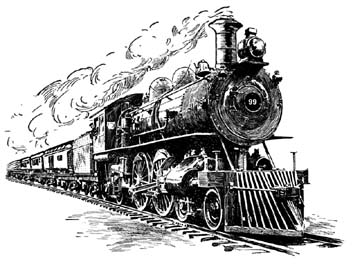
Imagine . . . you find a box containing items from years past, including a decaying map and a journal written about one year in an 1880s lumber camp. The journal tells the story:
After a daring 1883 rescue, Ingman Loken frees his 16 year old nephew, Tor, from a child labor scheme in a Chicago coal plant. Ingman brings him to the Loken' s lumber camp in far northwestern Wisconsin. There, Tor meets Namakagon, an Ojibwe Chief who knows of a secret silver mine. They soon learn that a sinister lumber baron intends to stop the Lokens from driving their timber down the river. Only a confrontation between the lumberjacks from the two lumber camps will decide who rules the river . . . the industrialists or the people.
More information can be found on this website and by e-mailing TreasureofNamakagon@gmail.com
See free excerpts and chapters RIGHT NOW! Just go to the top of this page and click on
'CLIPS from the book'
See 18 FREE SAMPLE CHAPTERS prior to purchasing. No obligation.
Click Here:
https://www.smashwords.com/books/view/51102
This book will give you a glimpse into
. the legendary lost silver mine .
What also remains is the quest to find the Namakagon mine. 1880s newspaper accounts prove it existed. It's location is still a mystery and many still search for the Treasure of Namakagon today. Your search for the treasure begins with the map below and the above links to other pages in this website. Good luck!
Below: "There, on the back, was what looked like a map."
